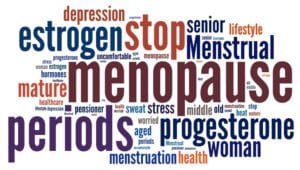Written by Taylor Woosley, Staff Writer. 12-week supplementation with EstroG-100® significantly reduced the total modified KMI score (measurement of menopausal symptom severity) in the treatment group compared to placebo (p < 0.01).
 Menopause occurs around one year after the last menstruation cycle, which stops due to the gradual decrease in ovarian function1. The number of postmenopausal women worldwide is expected to reach 1.2 billion by 20302. Menopause is associated with various symptoms, including hot flashes, sleep problems, mood disorders, sexual dysfunction, weight gain, and decline in cognitive functioning3.
Menopause occurs around one year after the last menstruation cycle, which stops due to the gradual decrease in ovarian function1. The number of postmenopausal women worldwide is expected to reach 1.2 billion by 20302. Menopause is associated with various symptoms, including hot flashes, sleep problems, mood disorders, sexual dysfunction, weight gain, and decline in cognitive functioning3.
Over the past decade, the use of complementary and alternative medicine to treat menopausal symptoms has increased4. Herbs such as angelica have been utilized to mitigate menopausal symptoms and stimulate immune responses related to increased oxidative stress during menopause5. EstroG-100®, a standardized herbal root extract of Cynanchum wilfordii, Phlomis umbrosa and Angelica gigas, has been researched for its ability to improve various menopausal symptoms including joint pain and hot flashes6.
Kim et al. conducted a randomized, double-blinded, placebo-controlled study to assess the efficacy of EstroG-100®. The study design was a multicenter 12-week trial using a daily dose of 514 mg EstroG-100® or a placebo. Study inclusion consisted of being a woman between the age of 40-70 years, who was experiencing moderate-to-severe menopausal symptoms with a modified Kupperman Menopausal Index (KMI) score of ≥20. Primary outcome measurements were changes in KMI scores. Subjects participated in four site visits, consisting of the screening visit, baseline visit, visit 3 (week 4), and visit 4 (week 12). At visit 1, participants’ demographic data, medical history, physical examination, mammography, PAP smear test, and a modified KMI score were recorded. During visit 2, subject’s blood test results (E2, follicle stimulating hormone (FSH)), and endometrial thickness were recorded. Visits 3 and 4 consisted of assessing intake compliance, anthropometric measurements, and modified KMI, along with obtaining blood tests (E2 and FSH) and endometrial thickness measurements.
96 participants completed the 12-week study, with 48 subjects participating in both groups. A paired t-test was utilized to analyze differences in the degree of changes before and after intake of EstroG-100® and the placebo. The two-sample t-test and the Wilcoxon rank sum test were used to check the statistical significance of intergroup differences. No statistical differences regarding participants’ baseline demographic data, age, BMI, or hormone levels were observed. Significant findings of the study are as follows:
- Changes in the total modified KMI score show a decrease of 11.94 ±41 and 20.31 ± 12.07 in the EstroG-100® group at weeks 4 and 12, respectively (p < 0.0001). The control group experienced decreases of 8.78 ± 8.66 and 14.10 ± 13.51 at weeks 4 and 12, respectively (p < 0.0001). However, statistically significant intergroup differences were noted at week 12 (p = 0.0089, p = 0.0163).
- Hot flash severity significantly decreased at week 4 (p = 0.0002) and week 12 (p < 0.0001) in the EstroG-100®. Furthermore, symptoms of fatigue decreased significantly at week 4 (p < 0.0001) and week 12 (p < 0.0001) in the treatment group.
- No statistically significant differences were noted between groups regarding changes in E2 and FSH levels, along with changes in endometrial thickness.
Results of the study show that 12-week supplementation with EstroG-100® significantly decreased the total modified KMI score compared to the placebo group. Symptoms such as hot flash severity, fatigue, nervousness, and melancholia were significantly improved in the treatment group. Further research should continue to explore the beneficial effects of EstroG-100® on menopausal symptoms.
Source: Kim T, Ryu K-J, Lee S, Lee D-J, Seo S-K (2022) A 12-Week, Multi-Center, Double-Blind, Randomized, Placebo-Controlled Clinical Trial for the Evaluation of
the Efficacy and Safety of the Herbal Extract (EstroG-100®) on Menopausal Symptoms. J Reprod Med Gynecol Obstet 7: 0106
© 2022 Kim T, et al. This is an open-access article distributed under the terms of the Creative Commons Attribution License, which permits unrestricted use, distribution, and reproduction in any medium, provided the original author and source are credited.
Click here to read the full text study.
Posted July 5, 2023.
Taylor Woosley studied biology at Purdue University before becoming a 2016 graduate of Columbia College Chicago with a major in Writing. She currently resides in Glen Ellyn, IL.
References:
- Kenda M, Glavač NK, Nagy M, Sollner Dolenc M, On Behalf Of The O. Herbal Products Used in Menopause and for Gynecological Disorders. Molecules. Dec 8 2021;26(24)doi:10.3390/molecules26247421
- Ilankoon I, Samarasinghe K, Elgán C. Menopause is a natural stage of aging: a qualitative study. BMC Womens Health. Feb 1 2021;21(1):47. doi:10.1186/s12905-020-01164-6
- Johnson A, Roberts L, Elkins G. Complementary and Alternative Medicine for Menopause. J Evid Based Integr Med. Jan-Dec 2019;24:2515690×19829380. doi:10.1177/2515690×19829380
- Ebrahimi A, Tayebi N, Fatemeh A, Akbarzadeh M. Investigation of the role of herbal medicine, acupressure, and acupuncture in the menopausal symptoms: An evidence-based systematic review study. Journal of family medicine and primary care. Jun 2020;9(6):2638-2649. doi:10.4103/jfmpc.jfmpc_1094_19
- Guo R, Guo S, Gao X, et al. Fermentation of Danggui Buxue Tang, an ancient Chinese herbal mixture, together with Lactobacillus plantarum enhances the anti-diabetic functions of herbal product. Chin Med. 2020;15:98. doi:10.1186/s13020-020-00379-x
- Kim T RK-J, Lee S, Lee D-J, Seo S-K A 12-Week, Multi-Center, Double-Blind, Randomized, Placebo-Controlled Clinical Trial for the Evaluation of the Efficacy and Safety of the Herbal Extract (EstroG-100®) on Menopausal Symptoms. J Reprod Med Gynecol Obstet 2022 2022;7: 0106
